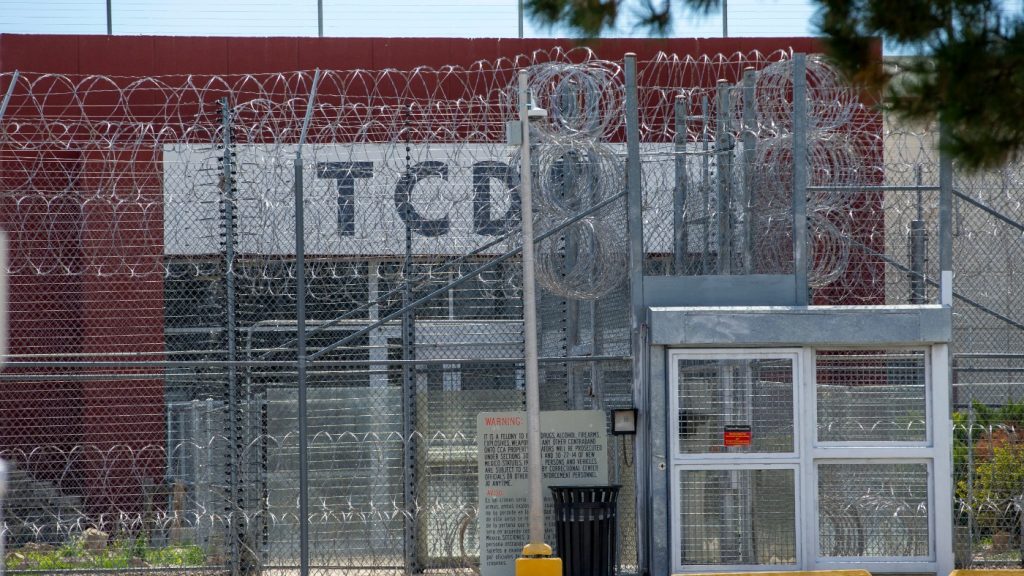Advocates for human rights are upset about the Biden administration's expansion of using detention for immigration enforcement. They see it as a betrayal driven by political pressure rather than actual needs.
200 organizations expressed their anger at the expansion of the harsh and unnecessary immigration detention system in a letter to President Biden.
Opponents of immigration detention are outraged by the sharp increase in detention spending, including $3.4 billion set aside for ICE detention in the $1.2 trillion federal spending package signed by Biden in March.
Groups working with and advocating for people who have been in immigration detention are disappointed by the administration's decision to further rely on detention. They see it as a complete reversal of Biden's promises during his campaign.
The Biden administration has shifted to a more conservative stance on immigration and border security due to changing political dynamics and a significant increase in migration. This has strained the relationship with human rights advocates who supported Biden's victory over former President Trump.
Among various contentious areas in immigration policy, detention is the most divisive.
Under current enforcement procedures, foreign nationals facing deportation are generally detained until their scheduled return flight, regardless of whether they have a criminal record or just administrative immigration violations such as visa overstays.
Officials argue that despite the increase in detention space in proportion to border encounters and immigrant population growth, a smaller proportion of the immigrant population is being detained than in the past.
In fiscal year 2023, ICE carried out 170,590 administrative arrests, and 43 percent of those arrested had prior criminal convictions or pending charges. This is an increase from the previous year, where only 32.5 percent of those arrested had a criminal history. according to official figures.
According to the data from the Transactional Records Access Clearinghouse (TRAC) at Syracuse University, as of April 7, 61.3 percent of ICE detainees have no criminal record, and many others have only minor offenses like traffic violations. Administration officials, similar to previous administrations, argue that immigration detention conditions are not punitive and are necessary for operational reasons..”
But for years, immigration detention has been linked to numerous alleged and confirmed cases of human rights abuses and inadequate care, as reported by government watchdogs and external groups.
The system being expanded by the administration is full of abuse and impunity. Senior officials have been aware of these severe human rights concerns since the beginning. ICE's jails and prisons operate with insufficient standards, and their inspections are notorious for concealing deficiencies, as highlighted by groups including Amnesty International USA, the National Immigrant Justice Center, Robert F. Kennedy Human Rights, and the International Refugee Assistance Project. “Insufficient medical care leads to deaths; LGBTQ individuals in custody experience homophobic and transphobic harassment and abuse; basic hygiene is often missing; Black immigrants face unaffordable bonds and violence at disproportionately high rates; and ICE’s use of solitary confinement frequently meets the definition of torture by the United Nations.” When Biden took office, detention was at an all-time low, largely due to reduced immigration and enforcement during the pandemic. Human rights advocates viewed this as a chance to get rid of an enforcement tool they consider unnecessary.“On the day you were inaugurated, fewer than 15,000 people were in ICE detention. This presented a significant opportunity to wind down a wasteful and abusive system,” wrote the groups.
Detention abolitionists were somewhat encouraged by budget requests for 2023 and 2024 where the administration asked for reduced detention funding, and by a growing top-down approach of internal review and investigations, including recommendations to close some detention centers with the most egregious violations.
“In a sudden change of direction, over the last two years, ICE has instead increased the number of people in custody. Most of the facilities on ICE’s internal closure list remain open, despite numerous reports from advocates and service providers further documenting the ineffectiveness of detention and the need for a different approach,” they wrote.
Administration officials argue that detention is operationally necessary for removal operations, especially with the growing number of encounters at the southwest border.
Many of the migrants released to the country's interior either have asylum cases that could fail in immigration court, or are released with preexisting orders of deportation. Others can be processed through expedited removal, a fast-track way to deport foreign nationals who are apprehended at or near the border within two weeks of entering the country, which generally requires detention.
Due to limited resources, the Biden administration in 2022 rolled back an expansion of expedited removal established by the Trump administration, which made any foreign national present anywhere in the country who could not prove their legal presence, or prove having been in the country for more than two years eligible for expedited removal.
Still, according to the American Immigration Council,
more than 20,000 migrants were placed in expedited removal
between May and December of 2023.
And expedited removals represent a fraction of ICE detainees. According to TRAC, 34,580 people were being held by ICE as of April 7.
The Biden administration has notably shifted policy from some Trump-era practices, including expansion of alternatives to detention — a series of controversial measures like digital tracking that advocates dislike, but prefer to detention.
But advocates and administration officials are operating under different paradigms of immigration policy: On one side mainly as an administrative field with broad humanitarian consequences, and on the other as a hybrid administrative and law enforcement matter subject to compulsory physical consequences and dependent on tactical deterrence. The groups stated that detaining migrants does not help achieve any logical policy goal. They believe that detention is not an efficient or ethical way to process border arrivals, and it does not show migrants that they are welcome in the United States. Instead, it is used to support the political aim of deterrence, which the groups consider to be cruel, inhumane, and misguided. They argue that even the harshest detention methods have been proven ineffective in discouraging people from seeking safety or a better life. In a letter to President Biden, 200 organizations expressed their anger over the administration's decision to expand the use of detention as part of immigration enforcement. They see this as a betrayal driven by political factors rather than actual needs. The groups find the expansion of the immigration detention system to be cruel and unnecessary, and they believe it goes against the principles they have long opposed.
And expedited removals represent a fraction of ICE detainees. According to TRAC, 34,580 people were being held by ICE as of April 7.
The Biden administration has markedly shifted policy from some Trump-era practices, including expansion of alternatives to detention — a series of controversial measures like digital tracking that advocates dislike, but prefer to detention.
But advocates and administration officials are operating under different paradigms of immigration policy: On one side mainly as an administrative field with broad humanitarian consequences, and on the other as a hybrid administrative and law enforcement matter subject to compulsory physical consequences and dependent on tactical deterrence.
“This suffering does not advance any rational policy goal. Detention does not provide an efficient or ethical means of border processing, and it certainly does not indicate to migrants that they are welcome in the United States. It merely exists to further the political goal of deterrence, which is cruel, inhumane and misguided — as even the most punitive forms of detention have been proven not to deter people from seeking safety or a better life,” wrote the groups.









